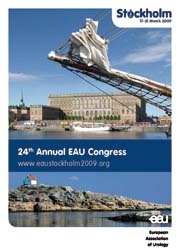UROLOGY
The 24th Annual European Association of Urology Congress
17-21 March
Stockholm
Sweden

The EAU is the world’s biggest and most influential congress for urologists; 10,000 delegates and 3,000 exhibitors are expected at this year’s event. Dynamism and expertise are the hallmarks of the high calibre Scientific Programme, which will focus on a wide-range of topics and pressing issues, including paediatrics, bladder cancer, female urology, reconstruction and functional urology, benign prostatic 0bstruction, stones and oncology, and more.
‘Urology beyond Europe’, an additional congress event on the 17 March, aims to intensify collaboration between the EAU and major urological societies worldwide.
For Professor Freddie Hamdy, Chairman of the EAU Scientific Congress Office, highlights include the lecture ‘Watchful waiting versus radical prostatectomy - an updated from the SPCG-4 trial’ by Professor Lars Holmberg (Uppsala, SE). ‘In 2005, the researchers reported that radical prostatectomy improved prostate cancer survival compared with watchful waiting after a median of 8.2 years of follow-up. Now results after three more years of follow-up are reported,’ Prof Hamdy explained.
Developments in molecular biology techniques have led to the identification of numerous genes and proteins believed to be relevant for prostate cancer development. This has resulted in the commercially available gene-based PCA3 test. Based on the available literature and new data, Dr Monique Roobol (Rotterdam, NL) will evaluate the prostate cancer antigen (PCA3) test in prostate cancer diagnosis. The serum PSA value is the most commonly used marker to detect and monitor prostate cancer, but prostate cancer is present throughout the entire PSA spectrum — confirmed from biopsy results in men randomised to the control arm of the Prostate Cancer Prevention Trial (PCPT).
Dr Martin Gleave will give the Société Internationale d’Urologie lecture ‘Castration resistant prostate cancer: New therapeutic approaches’. Advanced prostate cancer has high initial response rates to androgen ablation. However, remissions are temporary because surviving tumour cells usually progress to castrate-refractory prostate cancer. Dr Gleave will discuss the status of several novel agents in clinical trials, either as single agents or combined with cytotoxic chemotherapy, including the androgen receptor, endothelin receptor, and molecular chaperones.
During the ‘Best EAU papers’ session, Dr Smith (Boston, USA) is keen to present exciting results from his randomized, double-blind, placebo-controlled trial of denosumab in men receiving androgen deprivation therapy for non-metastatic prostate cancer.
According to Dr Johann de Bono (London, UK), who will present ‘New approaches to target androgen receptors in prostate cancer’, there is now incontrovertible evidence that what has been defined as hormone refractory prostate cancer is a disease that remains steroid hormone driven. Clinical evidence is now available that novel agents that target androgen synthesis and more potent androgen receptor antagonists have significant anti-tumour activity. He will be report on trials of these novel agents.
On 21 March, Professor Fritz Schröder (Rotterdam, NL) will provide an important update on the European Randomised Study of Screening for Prostate Cancer (ERSPC), a large study involving Belgium, Finland, France, Italy, Sweden, Spain, Switzerland and the Netherlands. His presentation will, for the first time, summarise results obtained by all centres.
Details: www.eaustockholm2009.org
01.03.2009











